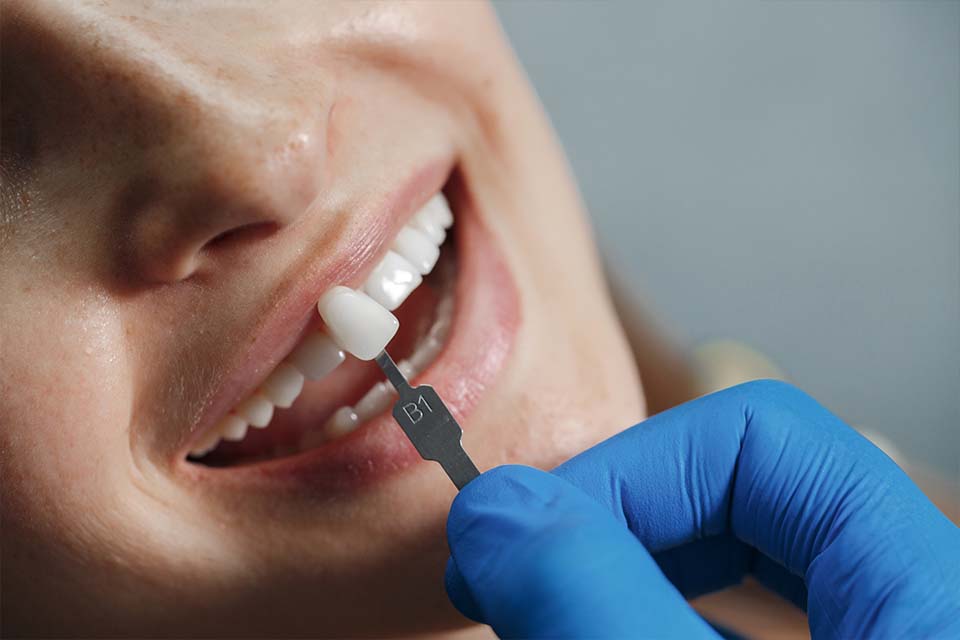Dental veneers are a popular cosmetic option that can transform your smile. These thin shells, made of porcelain or composite resin, bond to the front of your teeth to hide imperfections like discoloration and chips. There are different types of veneers: porcelain ones are durable and stain-resistant, while composite veneers offer a more affordable option but may need replacing sooner. Even no-prep veneers exist for those wanting minimal enamel removal. The benefits include aesthetic improvement and increased confidence. However, consider the costs and potential sensitivity after application. Proper care is crucial, just like with natural teeth, so be sure to maintain good hygiene!
Table of Contents
- What Are Dental Veneers?
- Different Types of Veneers
- Key Benefits of Dental Veneers
- Considerations Before Getting Veneers
- Overview of the Veneer Procedure
- Caring for Your Veneers
- Alternatives to Dental Veneers
- Research Insights on Veneers
- Frequently Asked Questions
1. What Are Dental Veneers?
Dental veneers are custom-made shells designed to cover the front surface of teeth, significantly enhancing their appearance. Typically made from porcelain or composite resin, the choice between these materials often depends on individual patient needs and preferences. Veneers can effectively address a range of dental concerns, such as gaps, chips, discoloration, or unevenness in teeth. The procedure is usually considered a quick solution for achieving a brighter smile, often requiring only a few visits to complete.
One of the appealing aspects of veneers is that they can be color-matched to blend seamlessly with surrounding teeth, providing a natural look. This makes them a popular choice for individuals looking for a cosmetic upgrade without undergoing extensive dental work. However, creating veneers requires careful planning and artistic skill to ensure that the final result is aesthetically pleasing.
It’s essential for patients to understand that veneers are primarily a cosmetic solution and do not address underlying dental issues. A consultation with a dentist is crucial to determine if veneers are the right choice for an individual’s specific dental situation. Keep in mind, veneers are not a one-size-fits-all solution; each case is unique and should be evaluated individually.
2. Different Types of Veneers
There are several types of veneers available, each with its unique characteristics and benefits. Porcelain veneers are popular for their strength and natural look; they resist stains better than other options and typically require a couple of appointments for fitting. Composite veneers, on the other hand, are applied directly to the teeth in one visit, allowing for quick adjustments to shape and color, but they may need to be replaced more frequently.
For those seeking a less invasive approach, no-prep veneers are a great choice. These can be placed without much enamel removal, making them ideal for patients looking to preserve their natural tooth structure. Lumineers, a specific brand of no-prep veneers, are ultra-thin and can be applied over existing enamel, often with little to no discomfort.
Pressed ceramic veneers are crafted in a lab, offering a durable and aesthetically pleasing solution for enhancing smiles. Temporary veneers are used while waiting for permanent ones, providing protection and improved appearance during that time. Lastly, snap-on veneers are removable and can serve as a quick fix for special occasions, though they are not intended for long-term wear.
Choosing the right type of veneer often depends on factors like budget, desired results, and the condition of your teeth. It’s essential to discuss these options with a dental professional to determine the best fit for your needs.
| Type of Veneer | Characteristics | Pros | Cons |
| Porcelain Veneers | Durable and stain-resistant; typically require 2-3 appointments. | Natural appearance; long-lasting; high stain resistance. | More expensive than composite veneers; irreversible enamel removal. |
| Composite Veneers | Made from resin; applied in a single visit; less expensive. | Can be sculpted to match desired appearance; quicker application. | Less durable; may require more frequent replacement. |
| No-prep Veneers | Minimal enamel removal; can be placed in a single session. | Less invasive option; preserves more natural tooth structure. | May not be suitable for all cases; limited durability. |
| Lumineers | Ultra-thin no-prep veneers; placed over existing enamel. | Minimal discomfort; reversible option; enhances aesthetics. | Limited to cases with minor imperfections; may not last as long. |
| Pressed Ceramic Veneers | Crafted in a lab; strong and aesthetically pleasing. | Durable; less invasive than traditional veneers; can match natural teeth. | Higher cost; may require enamel removal. |
| Temporary Veneers | Used while permanent veneers are being created. | Protects teeth; improves appearance temporarily; immediate cosmetic improvement. | Not a permanent solution; may not be as aesthetically pleasing. |
| Snap-On Veneers | Removable option for quick cosmetic fixes. | Convenient for special occasions; no adhesive involved; non-invasive. | Not for long-term use; limited ability to correct major dental issues. |
3. Key Benefits of Dental Veneers
Dental veneers offer several key benefits that make them an appealing choice for those looking to enhance their smiles. One of the standout advantages is aesthetic enhancement. Veneers can transform a smile by covering imperfections such as chips, gaps, and discoloration, leading to a more uniform and beautiful appearance. This boost in aesthetics can significantly improve a person’s confidence and self-esteem.
Another important benefit is stain resistance. Unlike natural teeth, especially for those who enjoy coffee or tea, porcelain veneers resist staining, helping them maintain their bright color over time. This means you can enjoy your favorite beverages without worrying about discoloration.
In terms of durability, veneers can last many years with proper care, making them a worthwhile investment. Patients can expect porcelain veneers to last up to 20 years, which underscores their long-term value. Plus, they require minimal maintenance, as caring for them is similar to looking after natural teeth, involving regular brushing and flossing.
For those eager for quick results, veneers can often be applied in just a couple of visits, which is faster compared to other cosmetic options. They are also customizable, tailored to fit individual preferences in size, shape, and color, ensuring that each patient leaves with a smile that feels uniquely theirs.
Additionally, veneers are less invasive than other alternatives like crowns, typically requiring less alteration of the natural tooth structure. They can also improve oral health by covering imperfections, thus protecting the underlying tooth from further damage. Their versatility allows them to correct various aesthetic issues, making them a popular choice for many patients. Ultimately, many individuals report enhanced smile confidence after receiving veneers, feeling happier and more satisfied with their appearance.
4. Considerations Before Getting Veneers
Before deciding on veneers, there are several important considerations to keep in mind. First, the cost can be significant, often ranging from $1,000 to $4,000 per veneer, depending on the materials used and the experience of the dentist. This means it’s essential to budget appropriately, as most insurance plans typically do not cover cosmetic procedures.
Another factor is tooth sensitivity. Some patients experience heightened sensitivity after getting veneers, although this usually subsides over time. Additionally, the process involves removing a layer of enamel, making it irreversible. This permanence requires careful thought about whether veneers are the right choice for you.
It’s also important to note that veneers aren’t suitable for everyone. Individuals with severe tooth decay or active gum disease should consider other options. Even though veneers are durable, they can chip or crack if subjected to excessive pressure, like biting hard foods.
Moreover, while porcelain veneers can last many years, they will eventually require replacement or repair. Good oral hygiene is crucial for maintaining their appearance and longevity, so be prepared to commit to regular brushing and flossing. Setting realistic expectations is vital; while veneers can dramatically enhance your smile, they have limitations.
Lastly, the experience of your dentist can greatly influence the outcome. Choosing a skilled professional can make a significant difference in the quality and aesthetics of your veneers. Don’t forget about follow-up visits; regular dental check-ups are essential to monitor the condition of your veneers and surrounding teeth.
5. Overview of the Veneer Procedure
The veneer procedure begins with an initial consultation where your dentist will assess your dental health and discuss your goals. This first visit is crucial for understanding what you want to achieve with your smile. After that, the next step involves enamel preparation, during which a thin layer of enamel is carefully removed from the teeth. This step is important for ensuring that the veneers fit properly.
Following the preparation, your dentist will take impressions or scans of your teeth. These impressions are used to create custom veneers that match your smile perfectly. While you wait for your permanent veneers to be made in the lab, temporary veneers may be placed to protect your teeth.
Once your permanent veneers are ready, they will be bonded to your teeth using a strong dental adhesive. After the bonding process, your dentist will make any necessary adjustments to ensure that your bite is comfortable and that the veneers look natural. A follow-up appointment might be scheduled to check the fit and appearance of the veneers, ensuring everything is just right.
Throughout this process, it’s important to receive patient education on how to care for your new veneers. Proper care can help you maximize their lifespan. Typically, the entire veneer process spans a few weeks, with most patients experiencing minimal discomfort along the way. Pain management options are available if needed, making the experience as smooth as possible.
6. Caring for Your Veneers
Taking care of your veneers is essential for ensuring they last as long as possible while maintaining their appearance. First and foremost, regular brushing is crucial; make sure to brush at least twice a day with fluoride toothpaste to keep your oral hygiene in check. Don’t forget to floss daily too, as this helps keep the gum line clean and prevents plaque buildup around your veneers.
It’s wise to avoid hard foods, like ice and hard candies, since these can chip your veneers. Also, be mindful of staining foods and drinks such as red wine, coffee, and dark berries, as they can lead to discoloration over time. Using a soft-bristled toothbrush, especially an electric toothbrush, can protect both your veneers and your natural teeth from damage.
Scheduling regular dental visits every six months for professional cleanings is a good practice, as your dentist can monitor the condition of your veneers and address any issues before they become significant. If you participate in contact sports, wearing a mouthguard can help protect your veneers from unexpected impacts.
Additionally, avoid using your teeth as tools to open packages or bottles, as this can cause damage. Staying hydrated by drinking plenty of water not only helps maintain overall oral health but also assists in washing away food particles. If you experience any discomfort or notice chips in your veneers, seek professional advice from your dentist promptly.
- Regular Brushing: Brush at least twice a day with fluoride toothpaste to maintain oral hygiene.
- Flossing: Floss daily to keep the gum line clean and prevent plaque buildup around the veneers.
- Avoid Hard Foods: Chewing ice or hard candies can chip veneers, so it’s best to avoid them.
- Limit Staining Foods: Red wine, coffee, and dark berries can stain veneers over time, so consumption should be moderated.
- Use a Soft-Bristled Toothbrush: This helps prevent damage to both veneers and natural teeth.
- Regular Dental Visits: Schedule check-ups every six months for professional cleanings and to monitor veneer condition.
- Mouthguard for Sports: Wearing a mouthguard during contact sports can protect veneers from unexpected impacts.
- Avoid Teeth as Tools: Never use teeth to open packages or bottles, as this can lead to damage.
- Hydration: Drink plenty of water to maintain overall oral health and help wash away food particles.
- Seek Professional Advice: If any issues arise, such as discomfort or chips, consult a dentist immediately.
7. Alternatives to Dental Veneers
If you’re considering enhancing your smile but aren’t sure if dental veneers are the right choice, there are several alternatives to explore. One popular option is teeth whitening, which can brighten your smile and tackle mild discoloration without changing the tooth structure. Dental bonding is another effective solution where a tooth-colored resin is applied to fix chips or gaps, often completed in just one visit. If your teeth are misaligned, orthodontics like braces or clear aligners can correct these issues and improve your bite, all without the need for veneers.
For teeth that are significantly damaged, crowns can be a great alternative. They cover the entire tooth, providing both strength and a better appearance. If you’re looking for a less intensive option, over-the-counter whitening strips might help with mild staining, although results can vary. Additionally, gum contouring can reshape uneven gum lines, giving you a more balanced smile.
If you’re dealing with missing teeth, implants offer a permanent solution that works seamlessly with your existing teeth. For those wanting a complete transformation, a smile makeover combines various cosmetic procedures tailored to your specific needs. Porcelain fillings can also improve aesthetics while restoring function for cavities or damage. Finally, consulting with a dentist is crucial, as they can discuss all these options with you and help determine the best path to achieve your desired results.
8. Research Insights on Veneers
The popularity of dental veneers has surged in recent years, with more individuals seeking cosmetic enhancements for their smiles. This trend is driven by a variety of factors, including the influence of social media, which has raised awareness about cosmetic dentistry. Studies show that patients who receive veneers often report high satisfaction levels, attributing improved self-confidence and happiness to their new smiles. Technological advancements have played a significant role in this field, enhancing the quality and longevity of veneers, allowing them to last up to 20 years with proper care.
Research also suggests that the psychological benefits of veneers can extend beyond aesthetics, positively affecting mental health and social interactions. The emergence of no-prep veneers highlights a shift towards minimally invasive techniques, making the procedure more accessible to a broader range of patients. Furthermore, ongoing education about veneers is crucial, helping people set realistic expectations and understand the care involved.
Comparative studies on different types of veneers guide patients in making informed decisions tailored to their unique needs. While the upfront costs can be significant, many find that the long-term benefits, such as enhanced quality of life and satisfaction, justify the investment.
Frequently Asked Questions
What are veneers and how do they work?
Veneers are thin shells made of porcelain or composite resin that are placed over your teeth, helping to improve their appearance. They can cover imperfections like chips, gaps, or discoloration, giving you a brighter and more even smile.
How long do veneers typically last?
Veneers usually last around 10 to 15 years with proper care. Good oral hygiene and regular dental check-ups can help extend their lifespan, so it’s important to keep up with your dental routine.
Are getting veneers a painful procedure?
Most people experience little to no pain during the process of getting veneers. Your dentist will use local anesthesia to numb the area, making it a comfortable experience. Afterward, you might feel some sensitivity, but it should go away quickly.
Can anyone get veneers, or are there certain conditions to consider?
While many people can get veneers, some might not be ideal candidates. If you have serious dental issues like gum disease or tooth decay, your dentist will want to address those first before considering veneers.
Do veneers require special care compared to natural teeth?
Veneers don’t require any special care beyond what you normally do for your teeth. Brushing, flossing, and regular dental visits will keep them in good shape, but avoid habits like biting your nails or using your teeth to open things.
TL;DR Dental veneers are thin shells of porcelain or composite resin that are bonded to the front of teeth to enhance their appearance. There are different types, including porcelain, composite, and no-prep veneers, each with various benefits like aesthetic improvement, stain resistance, and durability. However, considerations include costs, potential tooth sensitivity, and the irreversible nature of the procedure. The process typically involves a consultation, enamel preparation, and final placement of the veneers. Proper care and maintenance are essential for longevity, and alternatives like teeth whitening or bonding may also be considered.
Enspire Dental
Stay in Touch!
Latest Articles
Cosmetic Dentistry Options: Which Treatment Is Right for Your Smile
When it comes to cosmetic dentistry, patients in Ann Arbor have a range of options that can help achieve the smile they’ve always wanted. From teeth whitening to dental veneers...
Is Cosmetic Dentistry Worth It? Benefits for Confidence and Oral Health
Cosmetic dentistry in Ann Arbor is often viewed as elective, something done purely for appearance. But in reality, many cosmetic procedures improve both aesthetics and oral health...
Veneers vs. Bonding: How to Choose the Right Cosmetic Solution
If you’ve been researching ways to enhance your smile, you’ve likely come across two of the most common cosmetic options: porcelain veneers and dental bonding....
What to Expect From a Cosmetic Dentistry Consultation
If you’re considering improving your smile, the cosmetic dentistry consultation is the most important first step. Enspire Dental has a white glove treatment ensuring that each...


